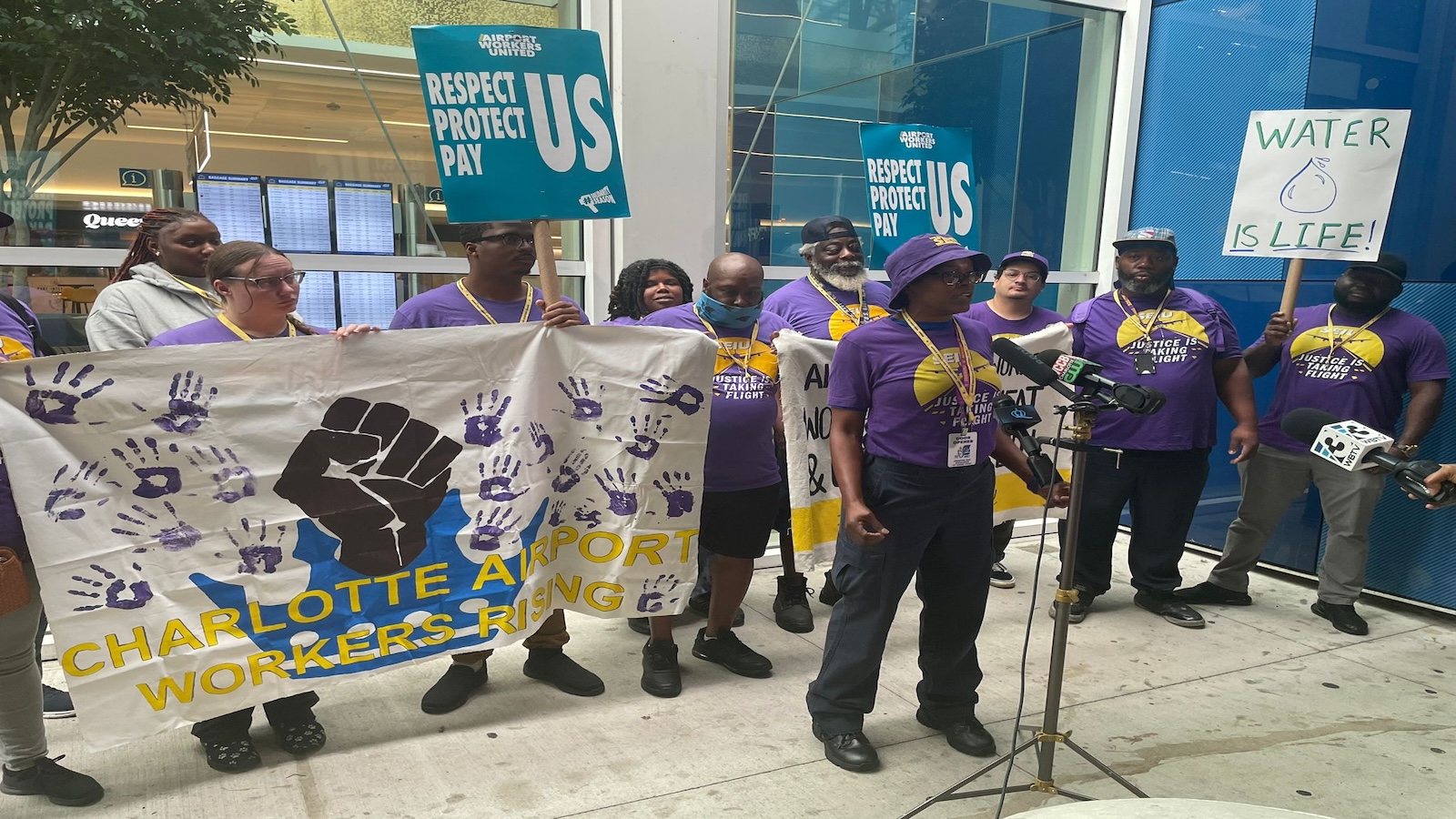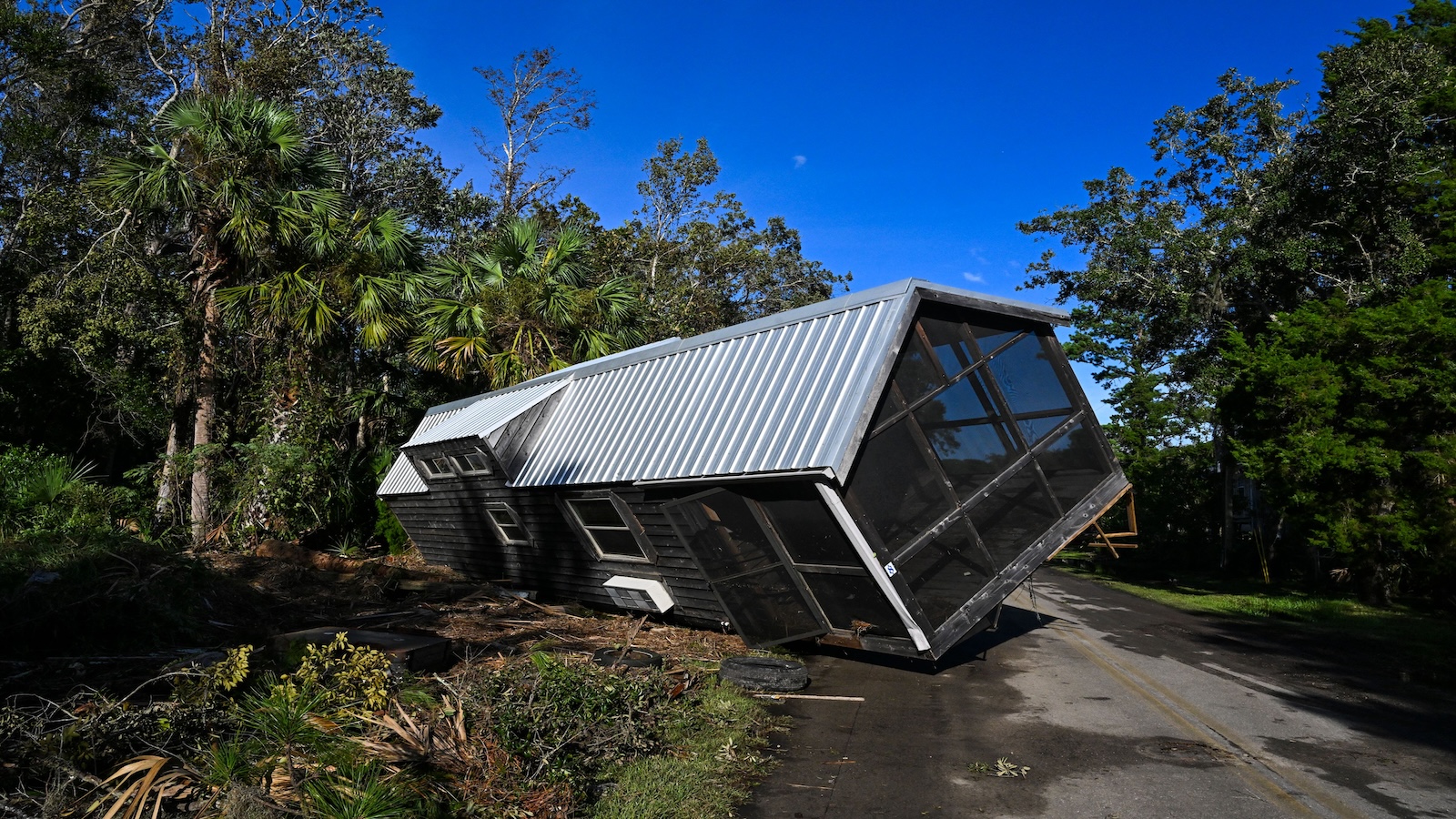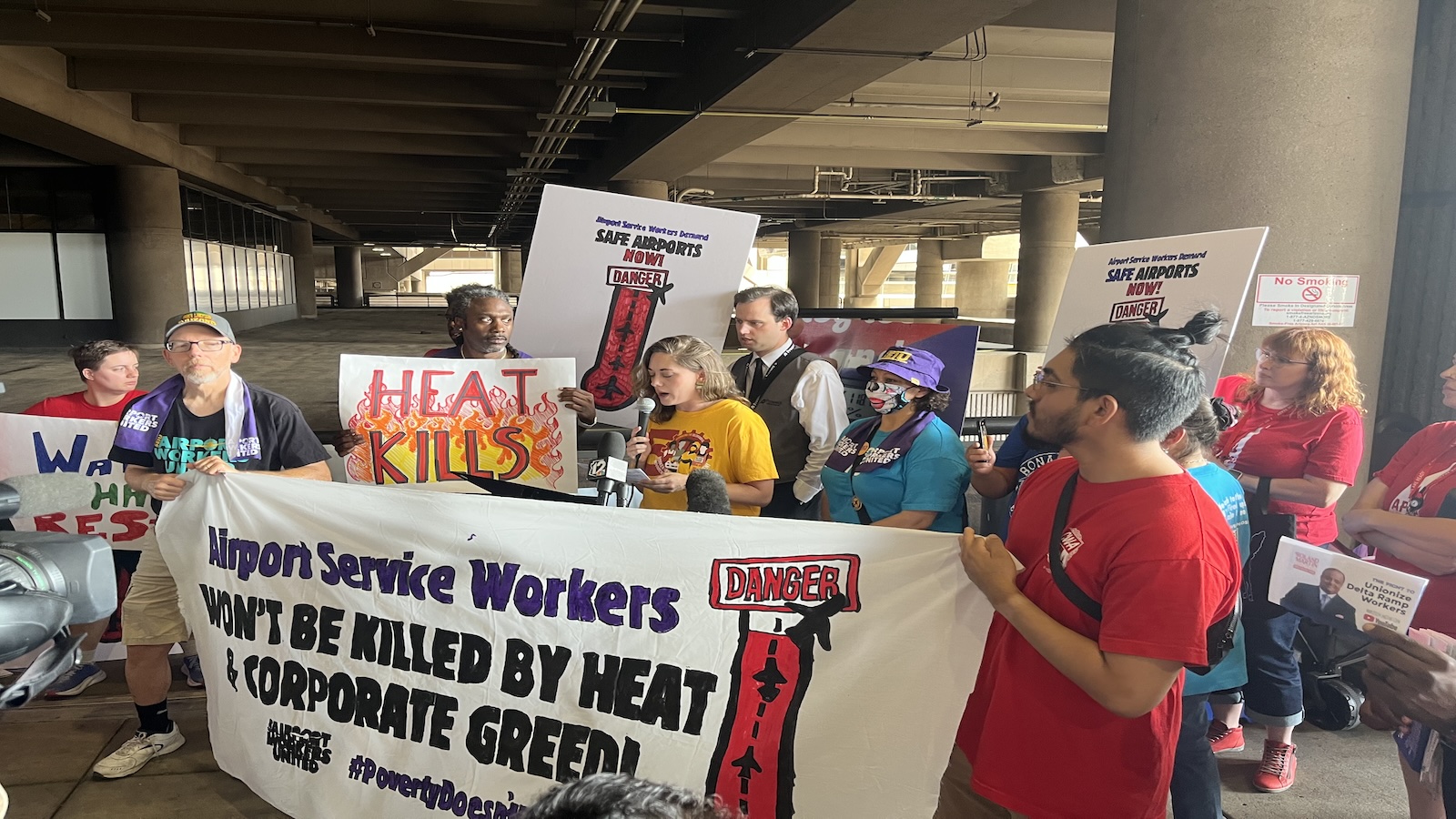For the past two years, Cecilia Ortiz has worked as a passenger attendant at Phoenix Sky Harbor International Airport. She typically has to walk 10 to 15 miles a day, climb up and down ramps, push heavy wheelchairs and carry passengers’ luggage. This summer, temperatures on the airport’s jetways reached over 110 degrees Fahrenheit, and yet, she says, her supervisors denied her breaks and water.
“I myself have heart failure and it is especially dangerous for me to work in extreme temperatures,” Ortiz said in a press conference. “I should not have to work in these conditions. No one should.” Easily accessible drinking water, a cool place to rest, breaks as needed and training on recognizing the signs of heat exhaustion are “very simple” ways to make their workplace safer in scorching temperatures, according to Ortiz.
Airport workers like Ortiz are being joined by workers in the fast-food, retail and agricultural sectors this week to demand heat protections for work from employers and the federal government. From Atlanta to Los Angeles, a series of rallies, town hall meetings and delegation meetings are taking place in 13 cities as workers and coalitions take their demands to elected officials.
On Tuesday, service workers gathered outside major airports in Charlotte and Phoenix, demanding that employers take immediate action to ensure their safety in the workplace, including adequate breaks and access to drinking water during periods of extreme heat.
In Phoenix, where local officials passed a heat ordinance earlier this year requiring many of these protections, workers and lawmakers raised alarm that the ordinance has led to insufficient improvements and questioned enforcement of the protections. “Why are we still demanding the bare necessities after passing an ordinance? Water. Breaks. These are human rights,” Phoenix City Councilwoman Betty Guardado said at the rally. Later this week, workers across the country will take a coordinated water break to highlight the need for access to potable water at work.
As human-caused climate change makes the planet ever warmer, extreme heat in the workplace is increasingly becoming a deadly threat. Organizers say “Heat Week” was also prompted by the recent sudden deaths of Wednesday “Wendy” Johnson, a postal worker in North Carolina, and Ronald Silver II, a garbage collector in Maryland. Both Johnson and Silver are believed to have died in part due to workplace heat exposure, which kills dozens of workers each year.
April Verrett, president of the Service Employees International Union, whose organization is one of the groups leading Heat Week, said these deaths could have been prevented with safer working conditions before calling on the Biden-Harris administration to strengthen, finalize and implement a federal heat rule. “Dying on the job is simply not an option and should never be part of anyone’s routine. Yet employers are doing nothing, thereby failing to protect the lives and health of workers,” Verrett said.
“Heat is a silent killer. It’s the biggest weather-related killer in our community,” said Rep. Greg Casar, a Texas Democrat, in the press conference. “I was born and raised in Texas. We know it’s hot, but it’s never been this hot this early and for this long. So, as the climate crisis worsens, we need to come together and take action at the national level that guarantees everyone the right to those rest and water breaks.”

International Union of Service Employees
In July, the U.S. Occupational Safety and Health Administration proposed a federal rule that would require employers to provide employees with cool rest areas, drinking water and breaks indoors and outdoors when temperatures reach 80 degrees Fahrenheit. But that rule has not yet been finalized and likely faces a lengthy review, additional revisions, possible legal challenges and an upcoming presidential election that could derail political will to implement it. Casar said elected officials at all levels must do more to increase the urgent push for heat protection measures.
This is especially important as some politicians seek legislation that goes in the opposite direction, Casar noted — referring to a law signed by Gov. Greg Abbott last summer that prohibited Texas cities from imposing heat protection measures on local workers. A similar law took effect in Florida this year. He stressed that the proposed OSHA rule, if passed, would “override laws like Gov. Abbott’s that eliminate heat protection measures.”
“We could get these heat protections enshrined in federal law this month if the Republican speaker of the House would put it up for a vote … but we can’t hold our breath,” Casar said. (In fact, House Republicans have introduced spending bills that would hamper OSHA’s ability to enforce existing regulations.)
The offices of Governor Abbott and Republican Speaker of the House, Congressman Mike Johnson, did not respond to requests for comment.
Last week, Rep. Ruben Gallego, an Arizona Democrat, criticized the Biden administration for not doing enough to address the effects of extreme heat. In addition to advocating for an OSHA standard, Gallego has introduced a bill that would add extreme heat to FEMA’s list of major disasters, The Hill reported. “Once again, the administration is all talk and no action when it comes to extreme heat in Arizona,” Gallego said in a statement following a speech by U.S. Health and Human Services Secretary Xavier Becerra, who called extreme heat in Phoenix a “public health crisis.”

‘A matter of life and death’: How disaster relief puts US farmworkers at risk
“When hurricanes or tornadoes hit, the feds offer help, but when it’s hot, they only give advice,” Gallego said. Others, like Senator Alex Padilla — a Democrat from California — have also pushed the administration to implement the proposed OSHA rule. “With climate change breaking heat records every summer, it has become increasingly important to require employers to provide common sense protections against heat stress,” Padilla told Grist. California is one of six states that have enacted heat protection rules for outdoor workers.
In June, Shae Parker was working at a grocery store in Columbia, South Carolina, when she suffered extreme heat exhaustion due to brutal temperatures and a lack of free water. “I had to leave work on a stretcher. I was vomiting. I was sweating profusely, dizzy and nauseous. It was unbearable,” Parker said. “We just have a body… at the end of the day, we want to go home to our families.”
Lourdes Cardenas, a farm worker in Fresno, California, is also struggling with the effects of the scorching heat. This summer, she endured several days of 40-degree Celsius in the fields. Combined with a lack of water, shade and too few breaks, she suffered dizziness and dehydration several times. Although she has alerted her superiors, water is still not easily accessible and she and her colleagues work far from shaded areas. “The heat is really hard and it gets worse every year,” Cardenas said in Spanish.
“We should have a right to water, a right to shade, a right to respite from the heat. But that’s not the case,” she said. “I know that a job is not worth my life.”

